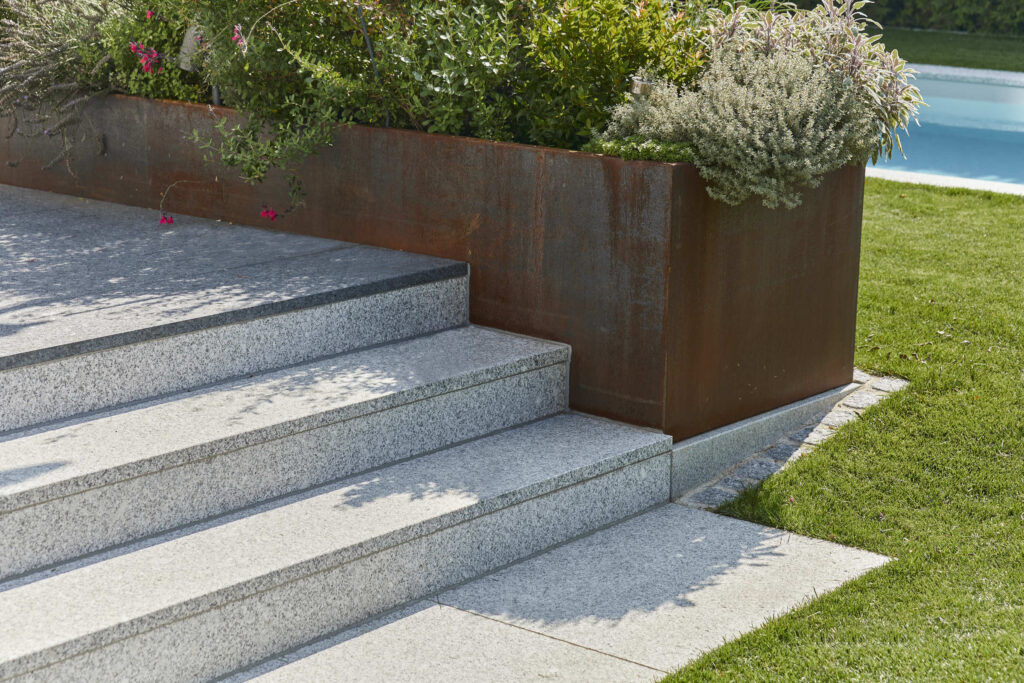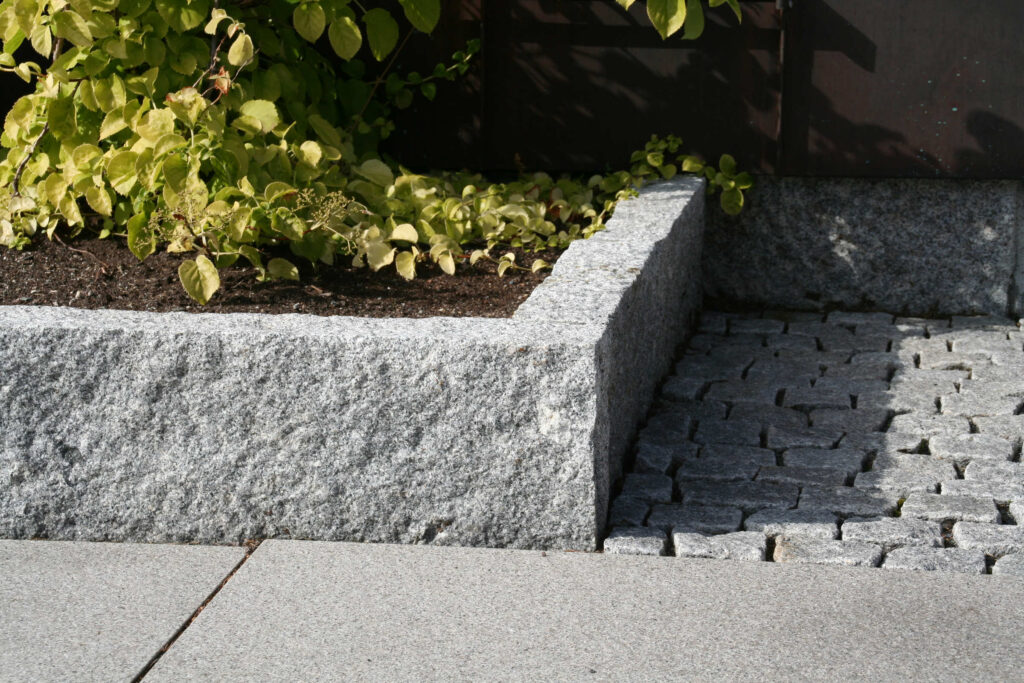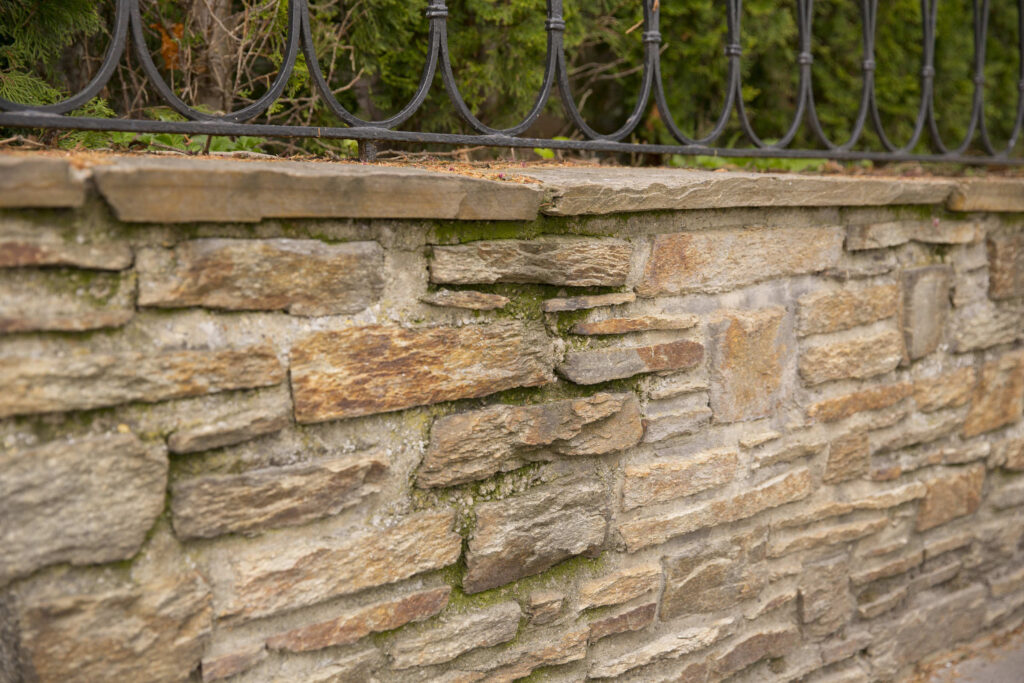Instructions and tips for cleaning marble, sandstone, slate and co.
Dust, dirt, scratches, stains, weeds and moss in the joints can detract from the beauty of your natural stone. Proper cleaning and care is essential so that you can enjoy your natural stone for a long time. Whether marble, granite, sandstone, limestone or slate indoors or outdoors - we explain how to clean your natural stone properly and keep it looking good for a long time.
The right products for different natural stones
Most natural stones have open pores - and are therefore particularly sensitive. Moisture and dirt can penetrate deep into the stone and damage it. Unsuitable cleaners - especially acidic cleaners - can also dissolve or damage the stone. However, as long as you use suitable cleaners for the natural stone, stone care is uncomplicated.
- Cleaning agent remove superficial soiling. They are available for different stones and degrees of soiling. Neutral cleaners or simple wipe cleaners are suitable for daily use. We recommend alkaline cleaners for heavier and stubborn stains.
- Care products form a protective layer on the surface of the stone. This can make the natural stone more resistant to various types of soiling and other external influences. Depending on the type of stone, there are various suitable care products.
Our tip: We offer you various Cleaning and care products for your natural stone. Our staff will be happy to advise you on site about the right cleaning agents or you can take Contact us with us.
Important to distinguish: Natural stone vs. porcelain stoneware
In contrast to natural stone, porcelain stoneware has a smoother, more even surface. This artificial stone is also more resistant to cleaning methods. It is therefore particularly important to know exactly what type of stone you want to clean.
Marble, slate, granite, sandstone - these natural stones have individual requirements when it comes to cleaning. While sandstone is very sensitive, granite is less demanding. When choosing the cleaning method and especially the cleaning products, make sure that they are suitable for the stone.
The preparation
Paving stones or floor tiles made of natural stone should first be swept with a broom. Remove coarser, superficial dirt such as dust, sand and soil. Use a soft brush attachment or broom or dry cleaning cloths to gently clean the surface. Tiles on the walls can be wiped with damp cleaning cloths.
To protect sensitive indoor furniture or outdoor plants from cleaning and care products, remove or cover them.
In indoor areas, open the windows during cleaning and leave them open until the stone is completely dry. The draught helps to dry the stones faster and to quickly remove the evaporated cleaning agents from the interior.
But beware: Have your natural stone tiles or paving stones only just been laid? Then you should definitely wait until the mortar is completely dry. If you have laid the tiles yourself, you will find this information in the manufacturer's instructions. Otherwise, you can obtain information from your tiler.
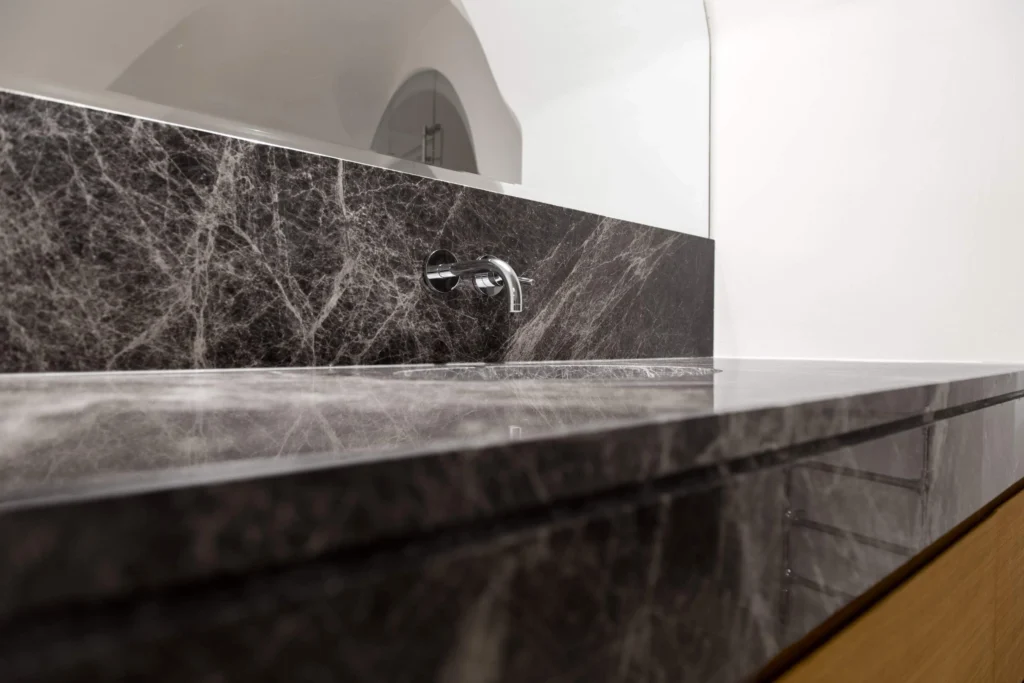
The right temperature
The ideal temperature for cleaning natural stone: +10° to +25° Celsius.
It is therefore advisable to clean natural stone outdoors in late spring or at the beginning of summer. The stones dry very quickly in sunshine and warm weather. This also prevents the formation of moss and algae.
For stones in indoor areas, you can switch on the underfloor heating in cooler temperatures. This allows the moisture to evaporate quickly from the stone.
Fresh water
Clean natural stone with fresh, lukewarm water. This is the ideal way to dissolve the cleaning agents and make maintenance easier. Many stains can even be removed without cleaning agents simply with water and a brush.
Make sure you use enough water to dissolve the cleaning agent and rinse it off thoroughly. Otherwise, a slippery layer could form on the surface of the stone.
Everyday care of natural stone
Neutral cleaners or a wiping care product are suitable for everyday care. Caring for natural stone is quite straightforward - it can simply be cleaned with water and a little detergent.
However, make sure you select the right products for your stone. Depending on whether you have sandstone, marble, granite, slate or another type of stone, you should use different cleaners. This will not only keep your stones clean, but also visually appealing in the long term.
Moist cleaning
If dirt has accumulated on the stone, you should clean it with a mild soap solution or a special agent. Many cleaners are based on soft or curd soap. Simply add this to the cleaning water. For very stubborn stains, you can rub the cleaning agent in with a soft brush or sponge and leave it to work for a few minutes.
Make sure you rinse the cleaning agent away carefully. Otherwise, a film may form that affects the stone's ability to breathe and also makes the surface slippery.
Intensive cleaning
To clean heavy soiling, leave the product to work for some time, depending on the product instructions, and treat the surface with a sponge or soft brush. Then rinse off the cleaning agent with plenty of water. Polish the tiles if necessary.
Cleaning paving stone tiles on the floor is generally straightforward. For tiles on the walls, we recommend a cleaning foam that adheres to the surface and can therefore penetrate the affected area.
Do you want to have your natural stone cleaned by professionals? We offer you a professional all-round Cleaning service - With us, your natural stone is in the best hands!
Impregnation
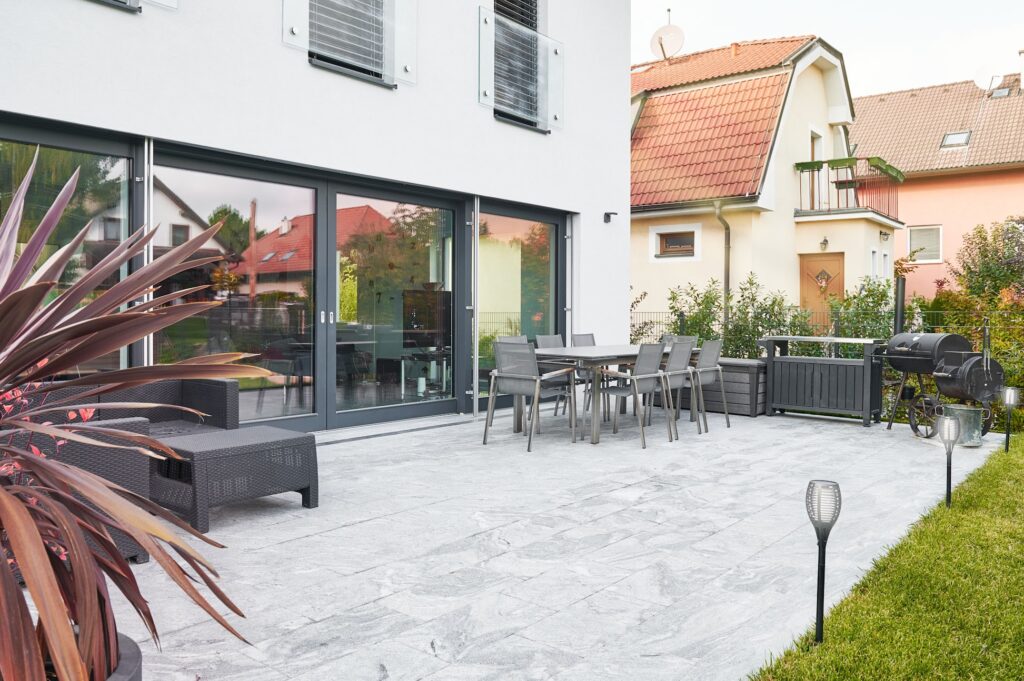
Impregnation is an additional protective layer on the natural stone. This makes it more resistant to external influences and also protects it from scratches.
Agents used to impregnate the stone are absorbed into the stone, but the breathability is retained. The impregnation is also practically invisible and therefore does not affect the appearance of the natural stone.
Natural stone should be impregnated annually or every four years, depending on the area where it is laid. Our experts at stone4you will be happy to carry out this service for you. This will extend the service life of your stones and reliably protect them from dirt, scratches, water and other environmental influences.
It is important that the impregnation is carried out on completely dry tiles. So choose a dry summer day or use underfloor heating to ensure that any moisture escapes from the tiles. If the natural stone is damp, the impregnation cannot penetrate the stone and the whole process is useless.
Additional care: floor polish and stone oil
Floor polish for indoor use
Sealing with floor polish ensures silky smooth and shiny tiles. Floor polish makes the surface of natural stone impermeable, meaning that no moisture can escape from the stone. For this reason, floor wax should only be used on indoor tiles.
Stone care oil for outdoor use and matt stone
Stone oil is suitable for matt natural and artificial stone and for natural stone outdoors. It is particularly suitable for open-pored stone floors such as terrazzo, terracotta, screed and concrete. The oil forms a water-repellent protective layer on the surface of the stone, making it harder for water and dirt to penetrate the stone.
Be sure to use a special stone care oil. Cooking oils, such as olive or coconut oil, are not suitable as they become rancid over time and start to smell unpleasant. Products based on vegetable oils and resins are more environmentally friendly than products containing mineral oil.
Stone restoration
If the stone floor is very dirty and worn - or perhaps already superficially damaged - cleaning is sometimes no longer sufficient. However, stone restoration can often save the natural stone and restore the beauty of your tiles or paving stones.
Different methods are used depending on the type of stone and the degree of damage. The surface is often simply ground down, polished and sealed.
Would you like to have your natural stone renovated? We can carry out a professional stone restoration for you! Take Contact us to get advice from our experts.
Tips for cleaning natural stone
We have summarized the most important tips for cleaning natural stone below:
Beware of household remedies such as vinegar, citric acid, soda, soap and the like!
There are a number of tips on the internet that state that natural stone can be cleaned with household remedies. In general, there is nothing wrong with home remedies. However, if you don't know exactly how the stone reacts to certain home remedies, the whole thing can quickly backfire.
- Soda, vinegar, household soap, baking soda and other agents are generally not recommended. These agents are either strongly acidic or strongly alkaline - depending on the type of stone, stones react sensitively to these high or low pH values and can be damaged.
- Surfactants can be problematic as they can penetrate deep into the stone and dry it out.
- Scouring agents based on baking soda can roughen the surface and leave the stone with unsightly scratches
A mild, pH-neutral and soap-free cleaning agent is best suited for domestic use. Alternatively, you can use specially developed stone cleaners that gently and carefully care for and clean your natural stone.
Test the cleaning agent on an inconspicuous area
It is advisable to test cleaners on an inconspicuous area of the stone before applying them to a large area. This allows you to observe how the stone reacts to the cleaning agent. This test is particularly important if you want to use household cleaning products.
Remove soiling as quickly as possible
Clean stains and soiling as quickly as possible. The longer you wait, the longer the stains will penetrate the stone and be more difficult to remove.
Water the lawn before cleaning paving stones
Water outdoor green areas before cleaning natural stone. This ensures that the plants absorb less water during cleaning, which could be contaminated by cleaning and care products.
Caution with high-pressure cleaners
Do not use high-pressure cleaners to clean natural stone! The powerful jet of water from high-pressure cleaners damages the stone surface, including the pores and joints. The impregnation can also be removed. These factors make the stone more sensitive to dirt and damage.
Gentle cleaning with lukewarm water is the best option for natural stone. Of course, you can still use a garden hose or similar to apply the water as long as the water pressure is not too high.
Only professionals, such as the experts at stone4you, can assess whether your natural stone can be cleaned with a high-pressure cleaner and how to proceed. That's why our experts use special high-pressure cleaners for professional stone cleaning.
Do not use acidic cleaning agents
Natural stone and acid go together like cats and dogs. Therefore, avoid vinegar or all-purpose cleaners and other acidic agents. Acid damages most natural stone - especially limestone and marble.
Alkaline cleaners, on the other hand, are generally very suitable for removing heavy soiling from natural stone. It is best to use pH-neutral cleaning agents for everyday cleaning.
Never use road salt
People who want to make roads and paths non-slip in winter often use road salt. However, this salt is not only harmful to soil and animals, but also damages all types of rock.
The problem: the interaction of salt, water and sub-zero temperatures. The salt water seeps into the stone, expands when it freezes and damages the stone from the inside. Even when the water evaporates and the salt crystallizes, fine cracks appear in the stone. Both processes cause considerable, irreversible damage to the natural stone.
Therefore, never sprinkle salt on your natural stone. It is best to use special sand or grit instead.
Cleaning natural stone paving stones
Paving stones in gardens and other outdoor areas are exposed to many different environmental influences. This is why paving stones need special care in order to give you many decades of pleasure.
In general, you can clean paving stones in the garden in the same way as stones indoors. First clean the paving stones with a broom. Then use a suitable cleaning agent, work on heavily soiled areas and then rinse the product off with plenty of water. We generally advise against using high-pressure cleaners for cleaning natural stone. However, you can use a pressure washer to clean granite paving stones, as this type of stone is very resistant.
Impregnation for paving stones is particularly useful to prevent dirt and moisture from penetrating deep into the stone.
In addition to cleaning the paving stones, cleaning the joints plays a special role. Moss and weeds in the joints can spoil the appearance of your paving stones. In extreme cases, the roots of the weeds in the joints can damage the stones. A flame weeder is an environmentally friendly method of removing moss and weeds in the joints between the paving stones. This means that no chemicals or toxins are released into the environment.

